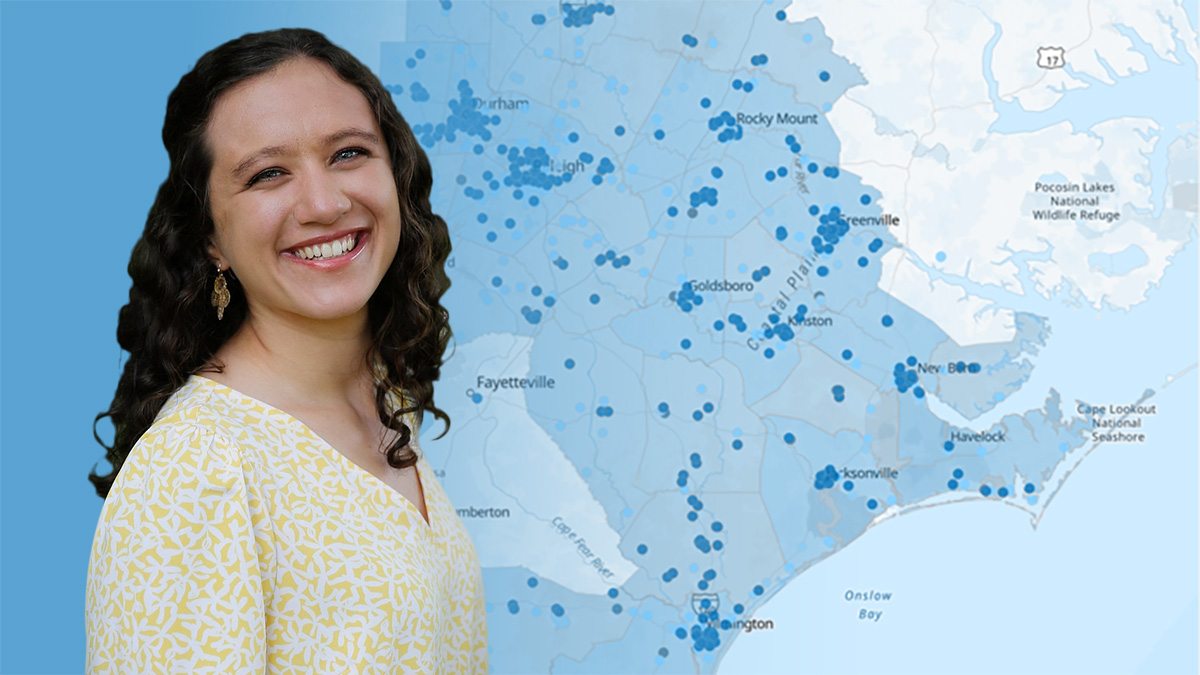MPA student uses research to increase food security
Anna Naples built a map to deliver fresh produce to North Carolinians in need.

Anna Naples’ graduate research focuses on an area she’s extremely passionate about and, as a North Carolinian, one close to home: food insecurity.
Naples, a second-year student in the Master of Public Administration program in the School of Government and leadership annual giving officer in the University Development Office, reflected on her unique experience.
“Being an employee, specifically in fundraising, gives me a different perspective of how important this University is to our state and knowing that this is only one of an incredible number of partnerships that exist to change people’s lives and have everybody’s basic needs met,” she said.
Winner of a 2023 Impact Award, Naples’ research began as a project for a class with Maureen Berner, professor in the School of Government. Berner connected her with the Food Bank of Central & Eastern North Carolina, which needed help understanding whether it was meeting the needs of the people across the 34 counties it serves.
“Anna did amazing work. From the first day of class, she was committed to doing a research project with a positive, meaningful impact in North Carolina,” said Berner.
Naples began by looking at distribution data from June to December 2021 and tracked produce sent across the state to pantries per month. She found that 50% of pantries didn’t receive any produce. At the county level, she evaluated the number of pounds available to each person under the poverty line and found an average of about 6.5 pounds of produce per person.
“It’s pretty shocking. When I think about for myself – if I got a head of broccoli, that could be all my produce for an entire month,” Naples said.
“All of Carolina’s graduate students have the potential to change the lives of North Carolinians. Our job as faculty is to help them unlock that potential. We are so proud of Anna and all our students committed to public service.” – Maureen Berner, School of Government
Using GIS, Naples built a map that showed the counties and areas in the state that needed more produce access. The Food Bank immediately used the data to aid three initiatives: the Pop-Up Market program, hospital partnerships and community health trends.
The Pop-Up Market program was able to see, via the maps Naples created, where pop-up produce markets would best serve communities across North Carolina, filling gaps in the Food Bank’s assistance.
Partnerships between the Food Bank and local hospitals in the state ensure food availability to patients who wouldn’t otherwise have access to nutritional meals. Naples’ map was used to identify produce insecure areas to bolster efforts to connect hospital patients with produce.
Additionally, Food Bank staff were able to connect community health trends with produce distribution to look for correlations.
“Working with Anna’s research has enabled us to look at how chronic disease rates and produce accessibility may correlate through our service area. It has helped us to launch our own team mapping initiative to dive deeper into disparities within our communities to provide community specific education and work alongside partner agencies to increase capacity for produce distribution,” said Jenny Ryan, nutrition education manager for the Food Bank of Central & Eastern North Carolina.
Naples hopes that the work she’s done can continue to serve as a resource for the Food Bank to identify where food-insecure people of North Carolina can be better served.
“Knowing how critically important these services are and what a tangible difference they can make is incredibly meaningful, because my goal is to work with issues of systemic poverty and food insecurity,” said Naples. “I feel really thankful to be one of the researchers who’s building partnerships and making a difference for people in our state and hopefully building research in the future.”




